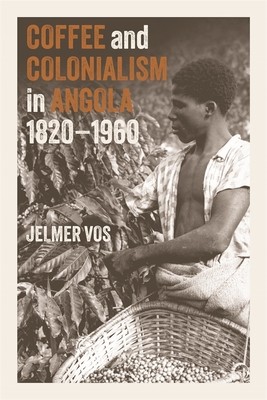
- We will send in 10–14 business days.
- Author: Jelmer Vos
- Publisher: James Currey
- ISBN-10: 1847013562
- ISBN-13: 9781847013569
- Format: 15.6 x 23.4 x 1.4 cm, kieti viršeliai
- Language: English
- SAVE -10% with code: EXTRA
Reviews
Description
A new perspective on Angolan colonial and labour history in the 19th and 20th centuries, which explores how the cultivation of coffee, the country's most significant export, shaped one of the oldest commercial frontiers in sub-Saharan Africa.
Coffee was Angola's most important colonial export crop from the 1820s, affecting the lives of thousands of farmers and plantation workers in Angola and the taste buds of millions of coffee drinkers worldwide. This book traces the emergence of a coffee economy in northern Angola following the collapse of the transatlantic slave trade, and documents its rapid expansion as global demand for robusta coffee increased in the years before and after the Second World War. The book highlights the ways in which small African farmers, European settlers, traders and consumers transformed local landscapes, labour regimes, and lifestyles in response to changes in the world coffee market. The coffee estates of white settlers became the largest employers of contract labour in Angola, and the author recounts the divergent experiences of the Africans involved in coffee's production, from slavery to forced labour, and describes how colonial labour demands affected African households. In addition, by linking the social and economic strategies of small coffee farmers to cultures of consumption, the book sheds light on the complex historical relationships between Angolan producers and the world economy.EXTRA 10 % discount with code: EXTRA
The promotion ends in 22d.17:52:12
The discount code is valid when purchasing from 10 €. Discounts do not stack.
- Author: Jelmer Vos
- Publisher: James Currey
- ISBN-10: 1847013562
- ISBN-13: 9781847013569
- Format: 15.6 x 23.4 x 1.4 cm, kieti viršeliai
- Language: English English
A new perspective on Angolan colonial and labour history in the 19th and 20th centuries, which explores how the cultivation of coffee, the country's most significant export, shaped one of the oldest commercial frontiers in sub-Saharan Africa.
Coffee was Angola's most important colonial export crop from the 1820s, affecting the lives of thousands of farmers and plantation workers in Angola and the taste buds of millions of coffee drinkers worldwide. This book traces the emergence of a coffee economy in northern Angola following the collapse of the transatlantic slave trade, and documents its rapid expansion as global demand for robusta coffee increased in the years before and after the Second World War. The book highlights the ways in which small African farmers, European settlers, traders and consumers transformed local landscapes, labour regimes, and lifestyles in response to changes in the world coffee market. The coffee estates of white settlers became the largest employers of contract labour in Angola, and the author recounts the divergent experiences of the Africans involved in coffee's production, from slavery to forced labour, and describes how colonial labour demands affected African households. In addition, by linking the social and economic strategies of small coffee farmers to cultures of consumption, the book sheds light on the complex historical relationships between Angolan producers and the world economy.

Reviews